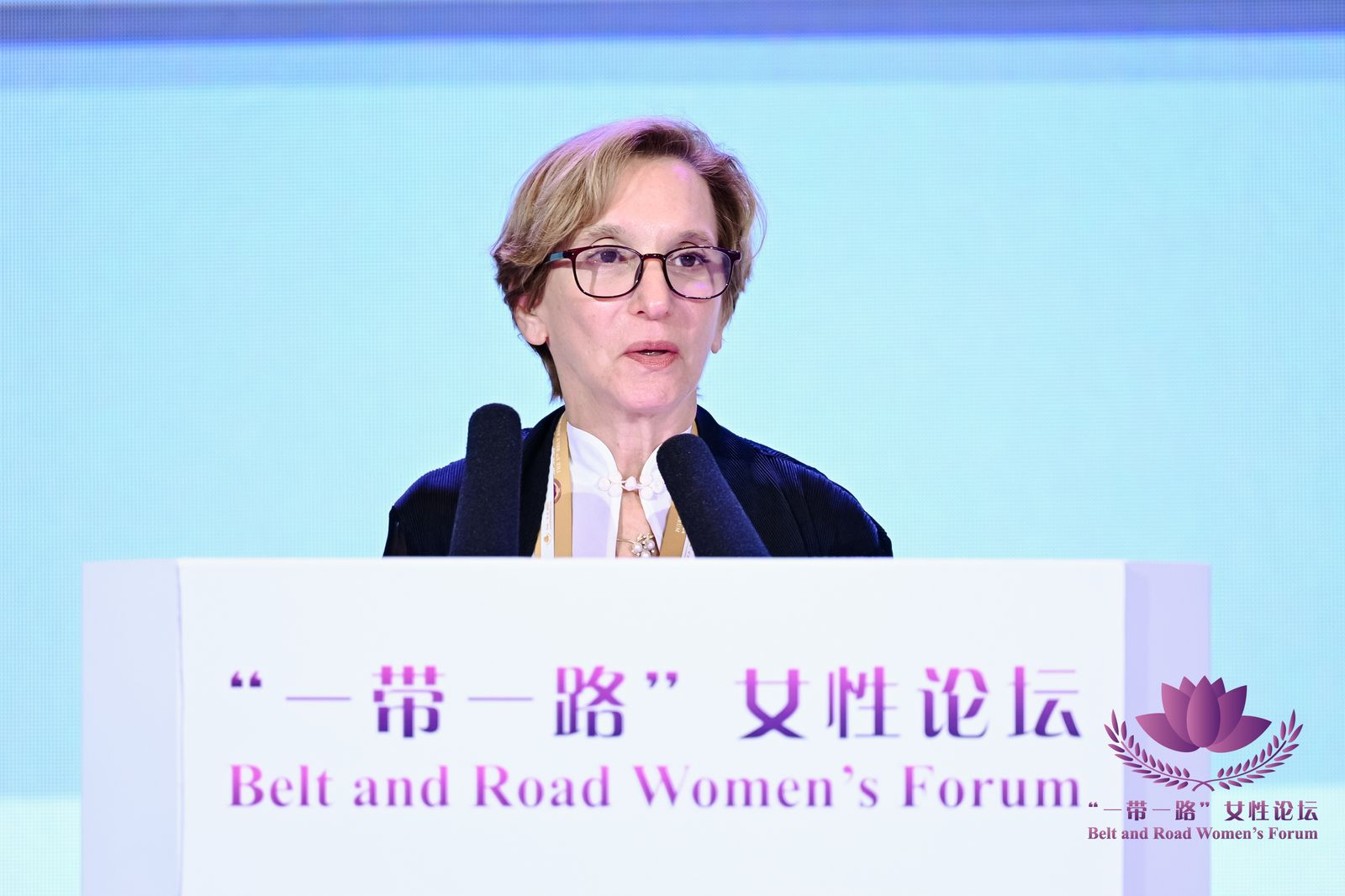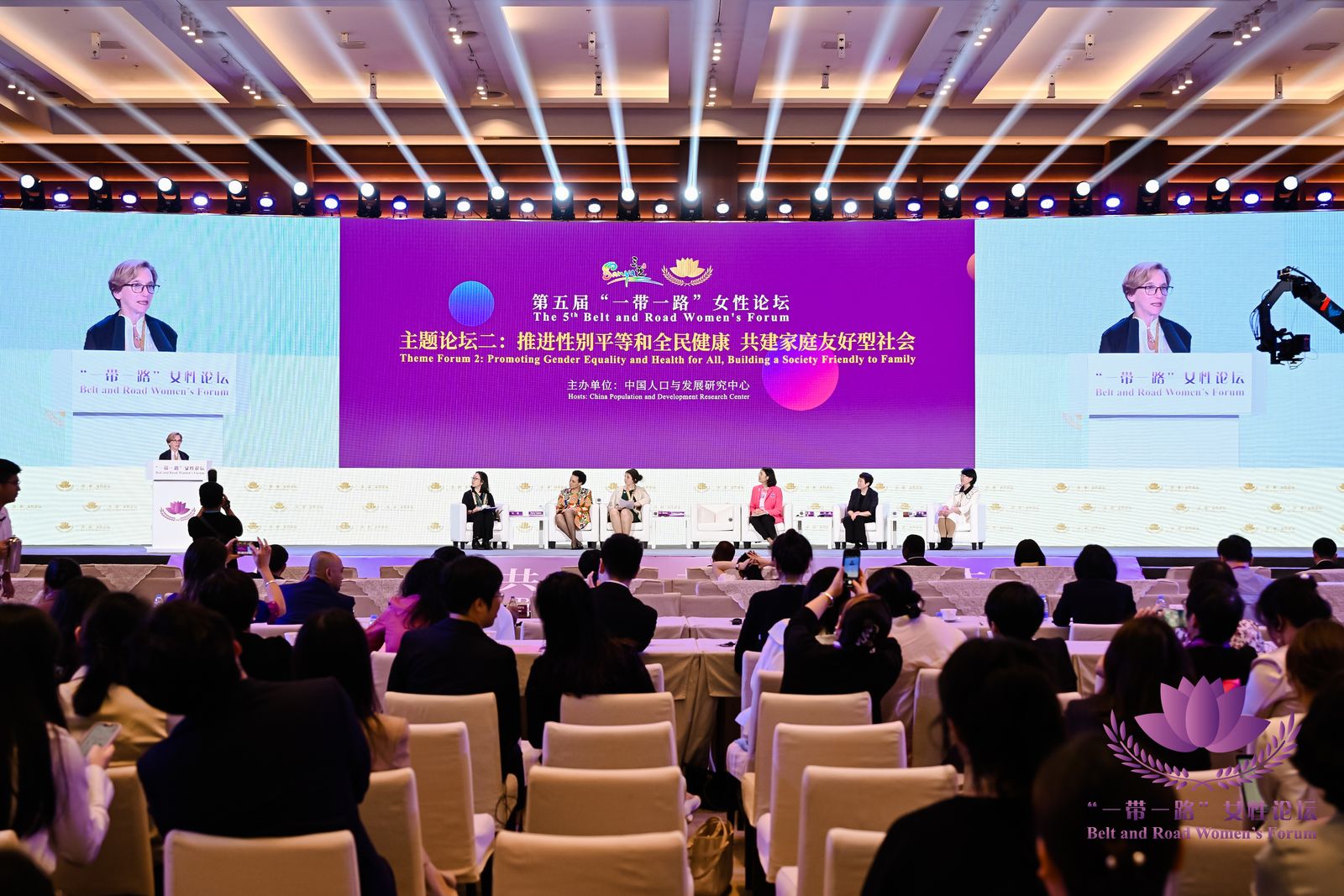Roberta Lipson, Founder of United Family Healthcare, attended the opening ceremony and delivered a speech
date:2023-12-25 10:30:04 hits:
The 5th Belt and Road Women’s Forum successfully convened in Sanya, Hainan from December 6-8. Co-hosted by the Chinese People’s Association for Friendship with Foreign Countries, the All-China Federation of Returned Overseas Chinese, and the UN Resident Coordinator Office in China, and jointly organized by the People’s Government of Sanya City, the China Friendship Foundation for Peace and Development, and the Secretariat of the Belt and Road Women’s Forum. Roberta Lipson, Founder of United Family Healthcare, attended the opening ceremony and delivered a speech.

Ladies, gentlemen, and sisters, good afternoon!
I am very excited about the opportunity to share a topic I am particularly passionate about at this forum, which is women’s health.
Women’s bodies are complex, extremely complex, and face many health challenges. If women’s overall health level is improved, it can create half of the productive capacity. Women’s health is also key to nurturing the next generation. In China, both men and women have seen significant improvements in various aspects of health. Women’s average lifespan has increased from 36.1 years in 1960 to 76.2 years in 2023, a 2.35-fold increase. Maternal mortality has decreased from 150 per 100,000 in 1955 to 20 per 100,000 in 2019, and injury rates have also declined. At the same time, the incidence and mortality rates of cancer in women have risen sharply. This may be due to a lack of research funding, a lack of screening programs, and the late introduction of the HPV vaccine.
In the United States, on the other hand, the death rates from all these cancers have fallen. United Family Healthcare Group in China owns 11 hospitals and over 20 clinics. For many years, we have been introducing international concepts and treatment methods into the health field of Chinese women. I want to talk more about cervical cancer, not only a focus of our company but also of our foundation, the Beijing United Family Medical Foundation.
This is a foundation that uses United Family Healthcare resources to provide medical solutions for populations unable to access medical care. Since 2008, the incidence and mortality rates of cervical cancer in China have been on the rise. In recent years, there are 100,000 to 150,000 new cervical cancer patients each year. In 2021, if women could be detected early and intervened through screening programs, more than 50,000 deaths from cervical cancer could be avoided. The World Health Organization has set a goal of vaccinating 50% of girls under 19 years old, screening 75% of women aged 30 to 45, and providing treatment for 90% of women with cervical cancer. The HPV vaccine is still quite expensive, but China has begun to produce more affordable vaccines, and hopefully, more young people will be vaccinated soon. Since 2008, China has implemented a national screening program, but to date, only 30% of women have been screened, far below the WHO’s target for eliminating cervical cancer.
That target is a 70% coverage rate for the population under 35 years old. The cost of past screening methods and delays in reporting results have caused some women to lose treatment opportunities. The United Family Medical Foundation visits impoverished mountainous areas annually to provide free cervical and breast cancer screening and treatment for local women.
We strictly follow the WHO’s process, including self-sampling, preventive education, rapid DNO testing with PCI, and same-day results. We can further examine and treat high-risk positive patients. With this method, a small team of three doctors and six assistants can screen and treat six hundred women a day. If screening could be conducted along the Belt and Road, there is hope of eradicating this disease.
There are other issues, such as HTD and other diseases that are not so fatal and receive even less attention. Addressing these can contribute to better health for women and, in turn, better contributions to society. I believe there are many ways to improve the health of more women, including birth rate and mental health issues, which would be beneficial not only for mothers and fathers but also globally.

The theme of the forum, ‘She Power: Jointly Building and Sharing a Beautiful Life,’ reflects a focus on women’s unique contributions and empowerment within the context of the Belt and Road Initiative. Organized by the Chinese People’s Association for Friendship with Foreign Countries, the All-China Federation of Returned Overseas Chinese, and the All-China Youth Federation, along with the People’s Government of Sanya City leadership, the forum brought together over 400 participants. These included the First Lady of Guyana, representatives from the United Nations, Nobel laureates in Physiology or Medicine, and ambassadors from Kyrgyzstan, Zambia, Maldives, Switzerland, Nepal, Guyana, Uganda, Mozambique, and various other countries, along with national and international business representatives.
During the forum, in-depth discussions and exchanges took place around the theme. Guests shared insights on the distinctive role played by women in the ten years since the Belt and Road Initiative was launched. They highlighted the substantial achievements of women and looked forward to the future of the initiative, advocating for women’s empowerment to foster common development and prosperity in human society.
2023 marks the tenth anniversary of the Belt and Road Initiative. Over the past decade, the Belt and Road Women’s Forum has been instrumental in showcasing the unique role of women in the development of the Belt and Road Initiative, promoting comprehensive and sustainable development for women, and enhancing people-to-people connections among the participating countries. The forum has successfully established a platform for communication and collaboration among women across the Belt and Road countries, building bridges for mutual understanding and cooperation.

Roberta Lipson, Founder of United Family Healthcare, attended the opening ceremony and delivered a speech
Ladies, gentlemen, and sisters, good afternoon!
I am very excited about the opportunity to share a topic I am particularly passionate about at this forum, which is women’s health.
Women’s bodies are complex, extremely complex, and face many health challenges. If women’s overall health level is improved, it can create half of the productive capacity. Women’s health is also key to nurturing the next generation. In China, both men and women have seen significant improvements in various aspects of health. Women’s average lifespan has increased from 36.1 years in 1960 to 76.2 years in 2023, a 2.35-fold increase. Maternal mortality has decreased from 150 per 100,000 in 1955 to 20 per 100,000 in 2019, and injury rates have also declined. At the same time, the incidence and mortality rates of cancer in women have risen sharply. This may be due to a lack of research funding, a lack of screening programs, and the late introduction of the HPV vaccine.
In the United States, on the other hand, the death rates from all these cancers have fallen. United Family Healthcare Group in China owns 11 hospitals and over 20 clinics. For many years, we have been introducing international concepts and treatment methods into the health field of Chinese women. I want to talk more about cervical cancer, not only a focus of our company but also of our foundation, the Beijing United Family Medical Foundation.
This is a foundation that uses United Family Healthcare resources to provide medical solutions for populations unable to access medical care. Since 2008, the incidence and mortality rates of cervical cancer in China have been on the rise. In recent years, there are 100,000 to 150,000 new cervical cancer patients each year. In 2021, if women could be detected early and intervened through screening programs, more than 50,000 deaths from cervical cancer could be avoided. The World Health Organization has set a goal of vaccinating 50% of girls under 19 years old, screening 75% of women aged 30 to 45, and providing treatment for 90% of women with cervical cancer. The HPV vaccine is still quite expensive, but China has begun to produce more affordable vaccines, and hopefully, more young people will be vaccinated soon. Since 2008, China has implemented a national screening program, but to date, only 30% of women have been screened, far below the WHO’s target for eliminating cervical cancer.
That target is a 70% coverage rate for the population under 35 years old. The cost of past screening methods and delays in reporting results have caused some women to lose treatment opportunities. The United Family Medical Foundation visits impoverished mountainous areas annually to provide free cervical and breast cancer screening and treatment for local women.
We strictly follow the WHO’s process, including self-sampling, preventive education, rapid DNO testing with PCI, and same-day results. We can further examine and treat high-risk positive patients. With this method, a small team of three doctors and six assistants can screen and treat six hundred women a day. If screening could be conducted along the Belt and Road, there is hope of eradicating this disease.
There are other issues, such as HTD and other diseases that are not so fatal and receive even less attention. Addressing these can contribute to better health for women and, in turn, better contributions to society. I believe there are many ways to improve the health of more women, including birth rate and mental health issues, which would be beneficial not only for mothers and fathers but also globally.

The theme of the forum, ‘She Power: Jointly Building and Sharing a Beautiful Life,’ reflects a focus on women’s unique contributions and empowerment within the context of the Belt and Road Initiative. Organized by the Chinese People’s Association for Friendship with Foreign Countries, the All-China Federation of Returned Overseas Chinese, and the All-China Youth Federation, along with the People’s Government of Sanya City leadership, the forum brought together over 400 participants. These included the First Lady of Guyana, representatives from the United Nations, Nobel laureates in Physiology or Medicine, and ambassadors from Kyrgyzstan, Zambia, Maldives, Switzerland, Nepal, Guyana, Uganda, Mozambique, and various other countries, along with national and international business representatives.
During the forum, in-depth discussions and exchanges took place around the theme. Guests shared insights on the distinctive role played by women in the ten years since the Belt and Road Initiative was launched. They highlighted the substantial achievements of women and looked forward to the future of the initiative, advocating for women’s empowerment to foster common development and prosperity in human society.
2023 marks the tenth anniversary of the Belt and Road Initiative. Over the past decade, the Belt and Road Women’s Forum has been instrumental in showcasing the unique role of women in the development of the Belt and Road Initiative, promoting comprehensive and sustainable development for women, and enhancing people-to-people connections among the participating countries. The forum has successfully established a platform for communication and collaboration among women across the Belt and Road countries, building bridges for mutual understanding and cooperation.
